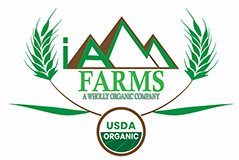Alabama’s Organic Food Scene: A Growing Trend
The state of Alabama, renowned for its rich history and vibrant culture, is rapidly becoming a beacon for organic food enthusiasts. With an increasing number of local farms dedicated to sustainable practices and a burgeoning interest in healthy living, Alabama offers diverse organic products that cater to a wide range of tastes and preferences. From fresh produce to grass-fed meats, the organic food scene in Alabama is thriving, making it an ideal destination for those seeking high-quality, environmentally friendly food options.
Local Organic Farms: The Backbone of Alabama’s Organic Movement
The local farms that adhere to strict organic farming practices are at the heart of Alabama’s organic food movement. These farms are committed to producing food free from synthetic pesticides, herbicides, and fertilizers, ensuring consumers receive the purest products possible. Notable among these farms is IAMFARMS, established in 2016 in Alabama, which has quickly gained a reputation for its dedication to organic farming. IAMFARMS produces various organic vegetables, fruits, and herbs, all grown using sustainable methods that promote soil health and biodiversity.
Farmers Markets: A Hub for Organic Produce
Farmers markets play a crucial role in connecting consumers with local organic farmers. Alabama boasts numerous farmers markets where residents can purchase fresh, organic produce directly from the growers. These markets provide access to high-quality food, foster a sense of community, and support local economies. Some of Alabama’s most popular farmers markets include the Pepper Place Market in Birmingham, the Mobile’s Market on the Square, and the Montgomery Curb Market. Each market offers a unique selection of organic products, from seasonal vegetables to artisanal goods.
Organic Restaurants: Culinary Excellence with a Commitment to Sustainability
Alabama’s dining scene also embraces the organic movement, with increasing restaurants focusing on organic ingredients. These establishments are committed to serving dishes made from locally sourced, organic produce, ensuring that patrons enjoy delicious and healthful meals. Noteworthy organic restaurants in Alabama include Bottega Café in Birmingham, known for its creative dishes and use of local, organic ingredients, and The Wildflower Café in Mentone, which offers a farm-to-table dining experience highlighting the best of Alabama’s organic produce.
Health Benefits of Organic Food
Choosing organic food comes with numerous health benefits. Organic produce is often richer in nutrients compared to conventionally grown food. Studies have shown that organic fruits and vegetables contain higher levels of vitamins, minerals, and antioxidants, which are essential for overall health. Additionally, organic farming practices reduce the exposure to harmful chemicals, ensuring your food is safe and free from toxic residues.
Environmental Impact of Organic Farming
Organic farming is beneficial for our health and the environment. Organic farms help preserve soil quality, protect water resources, and support biodiversity by avoiding synthetic chemicals and promoting natural farming methods. These practices contribute to a healthier ecosystem and a more sustainable future. In Alabama, organic farms like IAMFARMS are leading the way in environmental stewardship, demonstrating that producing high-quality food while caring for the planet is possible.
Community Supported Agriculture (CSA): A Direct Connection to Farmers
Community Supported Agriculture (CSA) programs offer another excellent way to access fresh, organic produce in Alabama. By joining a CSA, consumers can receive a regular supply of seasonal produce directly from local farms. This arrangement benefits farmers, who gain a stable income, and the consumers, who enjoy fresh, locally grown food. CSA programs in Alabama, such as those offered by Riverview Farms and Sand Mountain Farm, provide a diverse selection of organic products, including vegetables, fruits, and herbs, delivered directly to the members’ doorsteps.
Organic Certification: Ensuring Quality and Authenticity
Organic certification is crucial to ensuring the integrity of organic products. In Alabama, many farms are certified organic that have stringent standards the USDA set. This certification process involves regular inspections and strict compliance with organic farming practices. These certification ensure consumers that the products they purchase are genuinely organic. Farms like IAMFARMS proudly display their organic certification to reflect their commitment in maintaining the highest standards of quality and authenticity.
Supporting Alabama’s Organic Food Movement
Supporting Alabama’s organic food movement is a rewarding endeavor that benefits consumers and the environment. By purchasing organic products, you are contributing to the growth of sustainable farming practices and promoting a healthier lifestyle. Whether you shop at local farmers markets, dine at organic restaurants, or participate in CSA programs, there are numerous ways to get involved and make a positive impact. Additionally, advocating for organic food and educating others about its benefits can expand the reach of this critical movement.
To end, the organic food scene in Alabama is a testament to the state’s commitment to health, sustainability, and community. With a wealth of local farms, vibrant farmers markets, and innovative restaurants, Alabama offers a rich and diverse array of organic products that cater to all tastes. By embracing organic food, you are making a healthier choice for yourself and supporting a sustainable and environmentally friendly food system.

